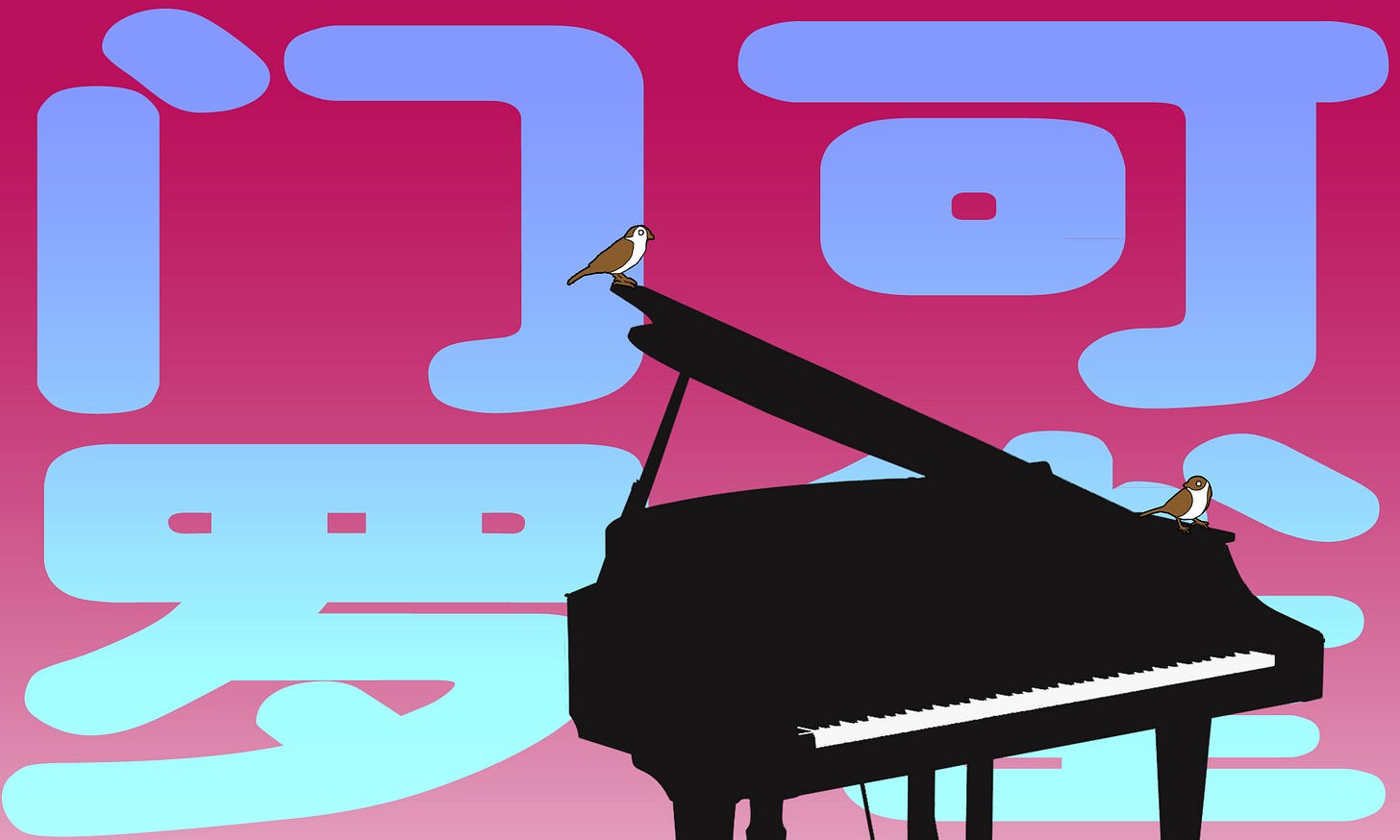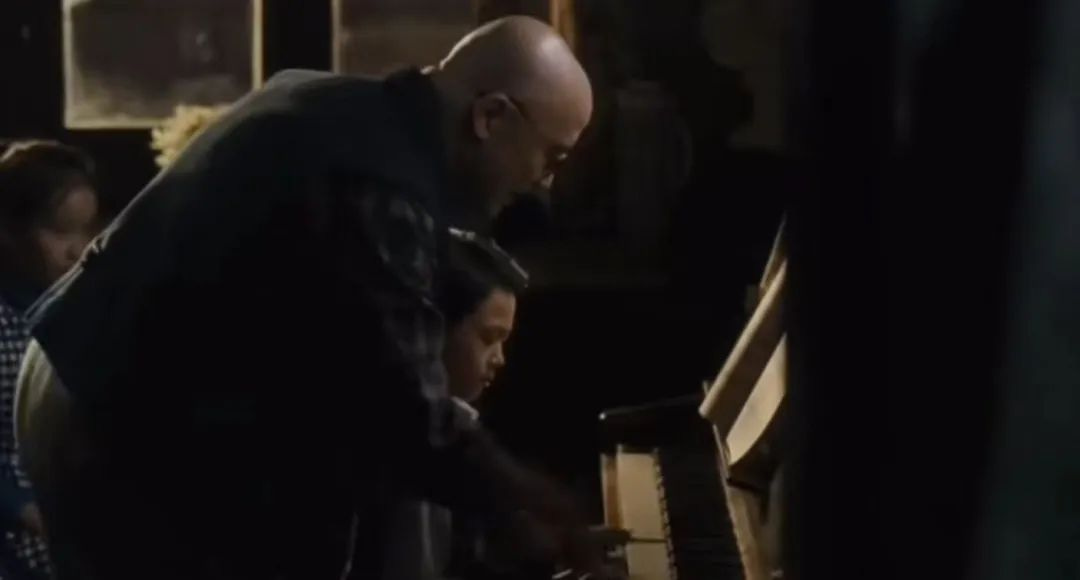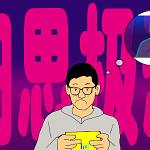Welcome to RealTime Mandarin—a multimedia resource to immerse you in the latest Chinese language trends, inspire you to practice and improve your Mandarin every week, and empower you to communicate with confidence.
Subscribe now to get the next issue straight to your inbox!
Piano sales in China are falling.
Since the middle of January “#piano sales dropped off a cliff” (钢琴销量断崖式下滑) has been trending on Weibo and other social media platforms.
One blogger noted:
"The owner of a piano factory said sales have completely collapsed.
Half of China’s piano factories closed down last year. People who bought their pianos for 50,000 to 60,000 yuan are not able to resell them even for 5,000 yuan."
“一个钢琴厂的老板说钢琴彻底崩盘了,去年一半钢琴厂倒闭了。以前5、6万买的钢琴,今年5000块出手都没人要。”
It’s the continuation of a trend seen over the last year.
The two leading piano manufacturers, which once accounted for half of the domestic market in China, both had a poor year in 2023.
The revenue of Pearl River Piano (珠江钢琴), China’s biggest piano manufacturer, fell by 31.47% year-on-year, with its net profit plummeting by 93.54%. Hailun Piano (海伦钢琴), the other listed piano manufacturer, saw its revenue in the first three quarters of last year fall by 21.99%, with net profit down by 24.73%.
The piano was once one of the most sought-after musical instruments for China’s aspiring middle-class families.
Since 2008, learning the piano has been hugely popular with Chinese parents, who are willing to pay large sums of money to buy the instrument and fund expensive lessons for their kids.
As well as being seen as a status symbol, taking up the piano was helpful for school and university applications:
Since 2008, with the implementation of the art talent bonus points policy for national middle school entrance exams, there was a sudden surge in the popularity of learning the piano.
This not only gave rise to many piano brands, but also created a multi-billion-dollar market for piano lessons and graded exams.
回到2008年艺术特长生中考加分政策施行,全国一夜之间掀起了学钢琴热,让不少钢琴品牌趁势崛起,也催生出钢琴培训、钢琴考级的千亿市场。[1]
But that policy was cancelled in 2018.
So the huge investment required to learn the piano became much less appealing.
In addition, China’s slowing economic growth has put further pressure on millions of families.
Looking for ways to reduce family spending, parents see their kids learning the piano as high cost, with little chance of becoming a viable career.
In the past couple of years, as economic growth has slowed, parents are finding it increasingly difficult to boost family income, forcing them to focus on cutting unnecessary expenses.
Hobbies such as playing the piano, which don't contribute directly to putting food on the table, are expensive, and undoubtedly the first to be cut from the budget.
近两年来,随着经济增速放缓,宝爸宝妈发现增加家庭收入“开源”已经越发艰难,自然只能在“节流”上做文章,清理不必要的开支了。而钢琴这种不能当饭吃,培养起来又非常昂贵的技能,毫无疑问是首先被清理的对象。[1]
So, inevitably, the fall in the number of students learning to play the piano, sales of the instrument have also dropped.
It is precisely because there are fewer people learning piano that no one is buying them!
Compared with the previous craze, parents are indeed less enthusiastic about encouraging their children to learn the piano. As a result, many teachers have much fewer students compared to before.
正是因为学钢琴的人少了,钢琴才卖不动的!比起以前的热潮,现在家长对让孩子学琴确实没那么热衷了,也使得钢琴老师由门庭若市变为门可罗雀。
So is the piano now in permanent decline in China?
That's what we explore this week!
Favourite Five
1. 鸡娃 jī wá
chicken baby, parents who push their children too hard academically
作为一名身处北京的家长,我这两年肉眼可见的是,身边想要鸡娃的家长越来越少了 - As a parent in Beijing, what I've observed over the past two years is that the number of "chicken baby" parents pushing their children too hard academically is clearly falling. [3]
2. 惨淡 cǎn dàn
bleak, dismal
上游工厂的消息,也印证了销售端的惨淡 - The news from the upstream factories also confirmed the bleakness on the sales end. [1]
Note: A word that was in all articles I read about this story.
Related:
窘境 jiǒng jìng - predicament, difficult situation
崩盘 bēng pán - collapse, market crash
3. 特长生 tè cháng shēng
students admitted for their special talents
要逐步压缩特长生招生规模,直至2020年前取消 - It is planned to gradually reduce the number of students admitted for their special talents, and ultimately cancel this admission category before 2020. [1]
Note: Students who enjoy favourable admission policies, getting bonus points in admission exams, in exchange for their "service" to the school once admitted, such as taking part in competitions.
4. 门可罗雀 mén kě luó què
deserted
使得钢琴老师由门庭若市变为门可罗雀 - As a result, many piano teachers have much fewer students compared to before.
More: Read more in Phrase of the Week.
5. 断崖式下滑 duàn yá shì xià huá
precipitous decline
就在1月16日上午,#钢琴销量断崖式下滑#,还一度登上微博热搜 - On the morning of January 16, the hashtag #piano sales dropped off a cliff # was trending on Weibo. [1]
Consuming the Conversation
Useful words
6. 标配 biāo pèi
standard configuration, typical choice
以往中产阶级鸡娃“标配”钢琴,现在落得个无人问津的境地 - In the past, it was typical for middle-class parents who push their children hard academically to let them learn the piano, but now it's something that no one takes interest in. [1]
7. 寒冬 hán dōng
harsh winter, economic downturn
但钢琴全行业的寒冬已不可避免地到来 - But the harsh winter of the entire piano industry is now unavoidable. [4]
Related:
寒意 hán yì - chill, coldness
8. 鸡肋 jī lèi
something of little value, useless
家长又费钱、又费神,亲子之间的关系还受影响,钢琴彻底成了鸡肋 - Parents spend a lot of money and energy, also risking the worsening relationship between them and their children, so the piano has become completely useless. [2]
9. 软肋 ruǎn lèi
pressure point, vulnerability
在现实面前,孩子更多是一代人的软肋 - In reality, children are more like the pressure point of their parents. [3]
10. 氪金 kè jīn
to spend money on online games, especially excessively
钢琴作为一项投入门槛极高的兴趣,意味着源源不断的“氪金” - The high entry threshold for piano as a hobby implies a continuous need to "spend a considerable amount of money ". [3]
11. 滞销 zhì xiāo
unsalable, slow-moving (of goods)
学琴的人锐减和钢琴滞销之间形成了恶性循环 - The sharp decrease in people learning the piano and the slow-moving sales of pianos have formed a vicious cycle. [4]
萎靡 wěi mí - languishing, listless
Three-character phrases
12. 不景气 bù jǐng qì
economic downturn















